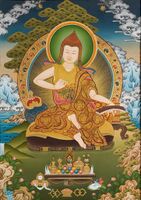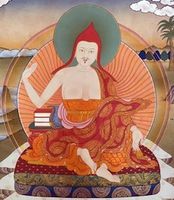Candrakīrti: Difference between revisions
No edit summary |
No edit summary |
||
| (25 intermediate revisions by 6 users not shown) | |||
| Line 1: | Line 1: | ||
== | {{Person | ||
|HasDrlPage=Yes | |||
|HasLibPage=Yes | |||
|HasBnwPage=Yes | |||
|MainNameTib=ཟླ་བ་གྲགས་པ་ | |||
|MainNameWylie=zla ba grags pa | |||
|MainNameSkt=Candrakīrti | |||
|PersonType=Classical Indian Authors | |||
: | |images=File:Chandrakirti.jpeg | ||
: | File:Candrakīrti.jpg | ||
: | |BdrcLink=https://www.tbrc.org/#!rid=P5782 | ||
|YearBirth=c. 570 | |||
|YearDeath=c. 640 | |||
|ReligiousAffiliation=Nalanda; Prāsaṅgika Madhyamaka | |||
|StudentOf=Nāgārjuna; Āryadeva | |||
|BnwShortPersonBio=An important Madhyamaka master and commentator on the works of Nāgārjuna and Āryadeva, associated especially with what would later be known as the Prāsaṅgika branch of Madhyamaka. Very little is known about his life; according to Tibetan sources, he was from south India and a student of Kamalabuddhi. He may have been a monk of Nālandā. He wrote commentaries on Nāgārjuna’s ''Yuktiṣaṣṭikā'' and ''Śūnyatāsaptati'' as well as Āryadeva's ''Catuḥśataka''. His two most famous and influential works, however, are his ''Prasannapadā'' (''Clear Words''), which is a commentary on Nāgārjuna's ''Mūlamadhyamakakārikā'', and his ''Madhyamakāvatāra'' (''Entrance to the Middle Way''). (Source: "Candrakīrti." In ''The Princeton Dictionary of Buddhism'', 165. Princeton University Press, 2014. http://www.jstor.org/stable/j.ctt46n41q.27.) | |||
|PosBuNayDefProv=Provisional | |||
|BuNayDefProvComplex=Yes | |||
|PosBuNayDefProvNotes="Buddha nature was taught merely as a means of temporarily easing ordinary persons of their fear of selflessness and of attracting non-Buddhists." [[Kano, K.]] [[Buddha-Nature and Emptiness]], p. 9. | |||
|BuNayWheelTurnComplex=No | |||
|BuNayYogaMadhyaComplex=No | |||
|BuNayZhenRangComplex=No | |||
|BuNayVehiclesComplex=No | |||
|BuNayAnalyticMeditComplex=No | |||
|PosEmptyLumin=Tathāgatagarbha was Taught Merely to Encourage Sentient Beings to Enter the Path | |||
|BuNayEmptyLuminComplex=No | |||
|PosEmptyLuminNotes="Buddha nature was taught merely as a means of temporarily easing ordinary persons of their fear of selflessness and of attracting non-Buddhists." [[Kano, K.]] [[Buddha-Nature and Emptiness]], p. 9. | |||
|IsInGyatsa=No | |||
|pagename=Candrakīrti | |||
}} | |||
: | |||
Latest revision as of 12:44, 18 September 2025
| PersonType | Category:Classical Indian Authors |
|---|---|
| MainNameTib | ཟླ་བ་གྲགས་པ་ |
| MainNameWylie | zla ba grags pa |
| MainNameSkt | Candrakīrti |
| YearBirth | c. 570 |
| YearDeath | c. 640 |
| ReligiousAffiliation | Nalanda; Prāsaṅgika Madhyamaka |
| StudentOf | Nāgārjuna · Āryadeva |
| BDRC | https://www.tbrc.org/#!rid=P5782 |
| IsInGyatsa | No |
| BnwShortPersonBio | An important Madhyamaka master and commentator on the works of Nāgārjuna and Āryadeva, associated especially with what would later be known as the Prāsaṅgika branch of Madhyamaka. Very little is known about his life; according to Tibetan sources, he was from south India and a student of Kamalabuddhi. He may have been a monk of Nālandā. He wrote commentaries on Nāgārjuna’s Yuktiṣaṣṭikā and Śūnyatāsaptati as well as Āryadeva's Catuḥśataka. His two most famous and influential works, however, are his Prasannapadā (Clear Words), which is a commentary on Nāgārjuna's Mūlamadhyamakakārikā, and his Madhyamakāvatāra (Entrance to the Middle Way). (Source: "Candrakīrti." In The Princeton Dictionary of Buddhism, 165. Princeton University Press, 2014. http://www.jstor.org/stable/j.ctt46n41q.27.) |
| PosBuNayDefProv | Provisional |
| PosBuNayDefProvNotes | "Buddha nature was taught merely as a means of temporarily easing ordinary persons of their fear of selflessness and of attracting non-Buddhists." Kazuo Kano Buddha-Nature and Emptiness, p. 9. |
| PosEmptyLumin | Tathāgatagarbha was Taught Merely to Encourage Sentient Beings to Enter the Path |
| PosEmptyLuminNotes | "Buddha nature was taught merely as a means of temporarily easing ordinary persons of their fear of selflessness and of attracting non-Buddhists." Kazuo Kano Buddha-Nature and Emptiness, p. 9. |
| Other wikis |
If the page does not yet exist on the remote wiki, you can paste the tag |


